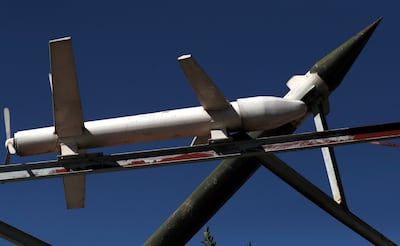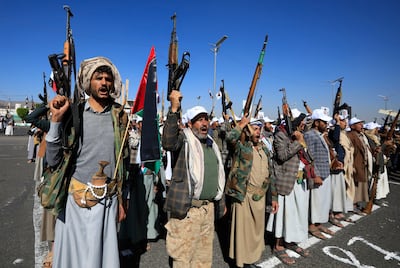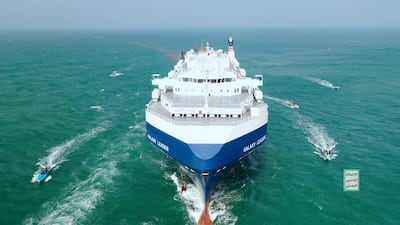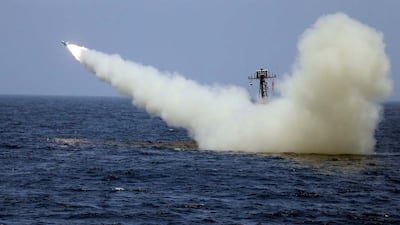Live updates: Follow the latest news on Israel-Gaza
Iran is “highly likely” to be directing Houthi attacks on shipping in the Red Sea as it tries to support Hamas’s war with Israel, military analysts have told The National.
The Iranian regime has supplied the Yemeni rebels with a large stockpile of anti-ship missiles, including the Khalij Fars, a ballistic weapon that can strike ships at high speeds.
On Sunday, the British-owned Unity Explorer was one of two commercial vessels attacked with drones and missiles.
The guided-missile destroyer USS Carney reportedly shot down two drones in the ships' defence.
Iran is allegedly supplying locations to the Houthis to enable them to attack specific ships but it reportedly does not want to escalate the Israel-Gaza war.
There is also a suggestion that the attacks could provoke a US response with a missile strike on Houthi targets in Yemen, although there are fears that this could also escalate the conflict.
International shipping organisations have called on world navies to protect merchant vessels, suggesting that a convoy system could be used to assist ships getting through the Red Sea.
UK Prime Minister Rishi Sunak and Israel's Prime Minister spoke on Tuesday about the incidents. A Downing Street spokesman said they “shared their concerns about increasing attacks by Houthi militants, supported by Iran, against commercial shipping vessels in the Red Sea”.
Mr Sunak stressed the UK’s commitment to freedom of navigation and highlighted the deployment this week of the HMS Diamond, a Royal Navy Type 45 Destroyer, to bolster deterrence in the region and keep trade routes flowing. He also said the UK would continue to support efforts to de-escalate tension and address the threat on Israel’s northern border with Lebanon.
Why Iran?
Analysts believe that Yemen is the safest option for Iran to become involved in the Israel-Gaza war without being significantly drawn into the conflict.
While Iran controls Hezbollah and its estimated 150,000-missile arsenal, it understands a mass attack from Lebanon would inflame the conflict with unknown consequences.
“It’s highly likely that the Iranians need to escalate in some way to demonstrate support for Hamas and as the Houthis are not the crown jewel in Iran's proxy network, it's an organisation with which they have a fairly transactional relationship,” said Sidharth Kaushal, of the Royal United Services Institute think tank.
“Operating through the Houthis is a way to triage between those two conflicting imperatives to do something but not to escalate.”
Farea Al Muslimi, of the Chatham House think tank, said that Iran’s “Axis of Resistance” against Israel was now firmly in the Red Sea.
“Even if the Houthis don’t actually inform Iran of an attack, it's much more significant as it means you have a ‘mini Iran’ in every way possible in the Red Sea,” Mr Al Muslimi said.
“You have something that's a worse version of a proxy of Iran.”
Another suggestion is that the Houthis might be mounting attacks to gain prominence and credibility.
“This is a very rare opportunity for them to establish themselves within public opinion as being thoroughly pro-Palestinian,” said Fabian Hinz, of the International Institute for Strategic Studies think tank.
Mr Al Muslimi said: “I think everyone continues to underestimate how reckless the Houthis are.”

Narrow straits
Yemen is in a key position, with its coastline stretching along the Red Sea close to the 30km-wide strait at Bab Al Mandeb.
Since the October 7 Hamas attacks on Israel, there have been seven attacks launched from Yemen on shipping in the area.
The Houthis have used cruise missiles and, for the first time, the Khalij Fars anti-ship ballistic missile.
Given that the attacks have been specific, it is believed that Iran has supplied intelligence, possibly gained through its three Noor military satellites.
“This may mean that the Iranians are providing direct operational support to the Houthis in terms of queuing and tracking targets,” said Dr Kaushal.
“This does appear fairly co-ordinated with Iran cueing targets for the Houthis because the Houthis don't have an ISR [intelligence, surveillance, reconnaissance] network to actually track maritime targets.”
The International Chamber of Shipping told The National that the Houthis have a “very, very well-developed intelligence network”, probably from Iran.

Strike back
So far, the US has refrained from striking the Houthis directly in Yemen, possibly to avoid escalation.
But naval experts have highlighted that the US has a substantial amount of firepower in the region that could strike at Houthi missile sites, radars and command centres.
A barrage of Tomahawk cruise missiles could be used in a swift retaliatory strike – as the US did in 2016 – without considerable escalation, suggested Tom Sharpe, a former Royal Navy commander.
It also has the USS Bataan, a small aircraft carrier and amphibious assault ship, which could send its aircraft or troops to attack targets.
“They have all the special forces on the planet on board and you could half expect these guys to be creeping up the beach at night and taking out radar sites,” said Mr Sharpe.
Although it is some distance away on the Gulf, the USS Eisenhower carrier could also be used to conduct air strikes.
But with the missile system based on the Iranian model of being mobile, the launchers will be difficult to detect and strike.
Houthi arms
The vast majority of Houthi anti-ship weaponry is of Iranian origin, although some might have been made in Yemen using Iranian parts, said Mr Hinz.
The Houthis have an impressive arsenal of anti-ship weapons that include Chinese-designed YJ-83 Saccade subsonic anti-ship cruise missile.
The Khalij Fars anti-ship ballistic missile has a range of 300km and carries a 650kg warhead that can strike at speeds of Mach 4, or 5,000kph.
“The Houthis have been very, very focused on building up an anti-shipping capability because they don’t want another blockade imposed,” Mr Hinz said.
“But you can also see from an Iranian perspective why it would be interesting to export the maritime incursion model that they’ve built up in the Gulf.”
While they have a significant arsenal, they are still dependent on Iran.
“Let's put it this way: if Iran decides to cut off support, they wouldn't have any anti-ship missile capability after a certain period of time,” Mr Hinz said.

Save our ships
John Stawpert, of the International Chamber of Shipping, has called for navy firepower to be “brought to bear to safeguard ships transiting the southern Red Sea and the Bab Al Mandeb”.
“We hope to see an increased presence of grey [navy] hulls in those waters for as long as this threat persists,” Mr Stawpert said.
“These actions are illegal under international law and we'd hope that countries that have influence on the Houthis will bring that to bear to put a stop to this.”
The ICS has issued guidance on routes for ships and self-protection measures developed amid heightened threats from Somali pirates.
They include crews retreating to a protective “citadel” inside their ships when under attack.
Mr Stawpert also called on navies to continue providing “maritime situational awareness” with threat intelligence to ships crossing the Red Sea.
More attacks could well lead to a rise in shipping insurance. Lloyd's of London refused to comment on the situation.
Tanker wars
There is a suggestion that even if a ship is hit and sunk< it is unlikely to lead to major escalation, as that is something all sides wish to avoid.
“There's a much higher tolerance for these things than you imagine,” Mr Sharpe said.
“You imagine one hit equals World War Three but look at the tanker wars in the '80s – there was a very high tolerance for strikes.”
But it will also be highly challenging tracking down targets.
“Even if you attack 10 installations, will that really deter them?” asked Mr Hinz.
“As terrible as it sounds, the Houthis have got quite used to air strikes in the last decade.”


